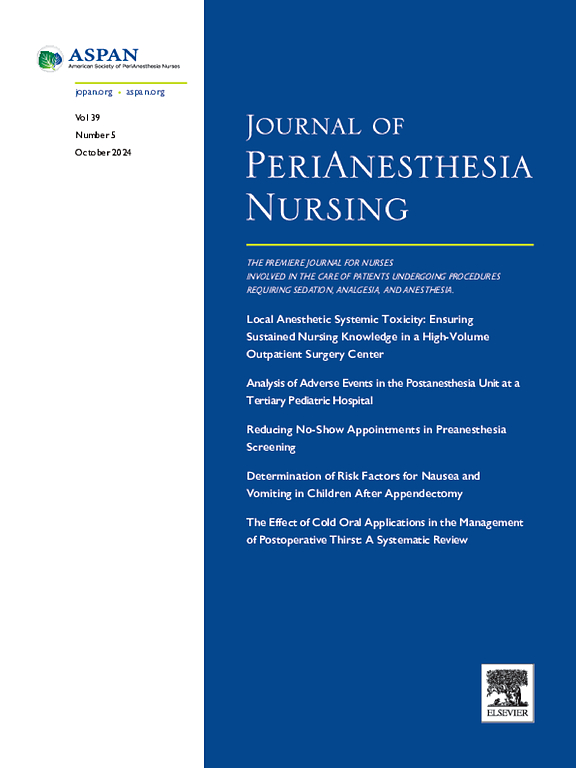每两名患者中就有一人没有完全理解书面的术前信息:关于功能性健康素养的探索性研究。
IF 1.6
4区 医学
Q2 NURSING
引用次数: 0
摘要
目的:调查接受晚期内窥镜治疗的患者自我感觉的功能性健康素养(FHL),探讨FHL能否解释患者围手术期经历的某些方面,并确定患者是否阅读了所提供的患者信息:前瞻性横断面探索研究:方法:100 名接受内镜胆管介入治疗的患者被纳入研究,并被要求回答瑞典语版 FHL 量表及其介入治疗的围手术期经历。除了手术数据外,还对所有数据进行了分组比较分析;高或低 FHL:研究共包括 100 名患者,其中半数患者认为他们的 FHL 存在问题或不足(低 FHL)。在那些认为自己FHL不足的患者中,大多数人在手术前没有阅读过所提供的信息。与FHL充足(FHL高)的患者相比,FHL有问题或不足的患者更经常出现围术期焦虑和疼痛:本研究支持以往关于低 FHL 与患者健康之间关系的研究。为了更好地满足患者的信息需求,麻醉护士和其他医疗服务提供者必须掌握有关 FHL 的知识。此外,该研究还强调了使用其他更有效的方法向患者提供信息的重要性。本文章由计算机程序翻译,如有差异,请以英文原文为准。
Every Second Patient Does Not Fully Understand Written Preprocedure Information: An Explorative Study About Functional Health Literacy
Purpose
To investigate the self-perceived functional health literacy (FHL) of patients who underwent advanced endoscopic treatment, explore whether FHL could explain aspects of patients' perioperative experiences, and determine whether patients read the provided patient information.
Design
A prospective cross-sectional explorative study.
Methods
One hundred patients who underwent endoscopic bile duct intervention were enrolled and asked to answer the Swedish version of the FHL Scale and their perioperative experiences of the intervention. Along with procedural data, all data were analyzed for group comparisons; high or low FHL.
Findings
The study included a total of 100 patients, with half of them rating their FHL as problematic or inadequate (low FHL). Among those who perceived their FHL as inadequate, a majority had not read the provided information before the procedure. Patients with problematic or inadequate FHL experienced perioperative anxiety and pain more frequently than those with sufficient FHL (high FHL).
Conclusions
This study supports previous research on the association between low FHL and patients' well-being. To better meet patients' information needs, it is crucial for nurse anesthetists and other health care providers to have knowledge about FHL. Additionally, the study highlights the importance of using alternative and more effective means of delivering information to patients.
求助全文
通过发布文献求助,成功后即可免费获取论文全文。
去求助
来源期刊

Journal of Perianesthesia Nursing
NURSING-
CiteScore
2.20
自引率
17.60%
发文量
279
审稿时长
90 days
期刊介绍:
The Journal of PeriAnesthesia Nursing provides original, peer-reviewed research for a primary audience that includes nurses in perianesthesia settings, including ambulatory surgery, preadmission testing, postanesthesia care (Phases I and II), extended observation, and pain management. The Journal provides a forum for sharing professional knowledge and experience relating to management, ethics, legislation, research, and other aspects of perianesthesia nursing.
 求助内容:
求助内容: 应助结果提醒方式:
应助结果提醒方式:


